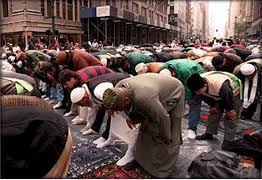Beliefs
- Beliefs for the Muslims are a purely personal affair – ex though it is charitable to guide people to the truth (Shahadah – “There is no god
 but God and Muhammad is the Messenger of God.”) it is not required of them.
but God and Muhammad is the Messenger of God.”) it is not required of them. - Muslims believe in one omnipotent, omniscient and omnipresent God and that his proper name is Allah.
- They believe that humans are limited in what they are able to know, and that God is the ever present, compassionate guide who will lead them to knowledge and fulfillment.
- They believe that every person living on earth has a soul that lives on earth for one lifetime and, upon the death of the body, moves on to an afterlife
- They believe that when a soul passes into the into the afterlife, God will reconfigure the person’s physical body so he or she can stand before Him on the Day of Judgment. They believe that God will either send the soul to Paradise or Hell depending on their actions in their life.
Prophets
- Noah – Noah warned people of the error of their sinful ways, built an ark, survived the flood, rebuilt civilization and shared new laws governing God’s creation.
- Abraham – Abraham is one of the seven prophets who received scriptures from God. He is mentioned frequently in the Qur’an. He taught people to abandon idolatry. Abraham proved to be the source of two great prophetic families: the Arab lineage through his son Ismael and Ismael’s mother Hagar. In the end, Abraham gave people a sense of their moral and religious obligations.
- Moses – Moses was sent to proclaim the one God to the idolaters of Egypt. Moses, who is mentioned over 200 times in the Qur’an, is very highly regarded in Islam. Moses used miracles to demonstrate God’s power over the Egyptians. He receives God’s law in the form of the Ten Commandments.
- Jesus – Jesus was born miraculously by the Virgin Mary and, over the course of his life, performed many miracles. However, the Qur’an specifically denies that Jesus was the divinely appointed son of God. The Qur’an also does not support the belief that Jesus died on the cross. Instead it holds the position that Jesus never died and ascended into heaven and will return to aid humanity again in the future
- Muhammad – Muhammad is “The Seal of the Prophets,” the last of those who have come to convey the divine wisdom of God to humanity. As with every prophet he is afforded the highest spiritual prominence because he directly received the divine word of God. He instantly conveyed these Quranic revelations to all people. For Muslims, Muhammad is the last prophet, who completed the teachings of all the prophets who came before him. All the preceding prophets are regarded as “Muslims” in the sense that they all taught: a) belief in One God, and b) the importance of living a virtuous and moral life. These two fundamentals constitute “Islam” in the broadest sense of the word.
The Five Pillars of Islam
- Shahadah – Declaration of Faith – 2 main declarations: ‘There is no god but God’ and ‘Muhammad is the Messenger of God’
- Shahadah is the Muslim announcement of their faith
- Salat – Mandatory prayer five times a day – mandatory prayer before dawn, mid-day, late afternoon, after sunset and after dark
- After salat a person must perform a ritual cleansing know as the wudu or even a full body cleansing called the ghusl
- Zakat – Mandatory Charity/aimsgiving – Islamic law says that a person should give at least 2.5% of surplus of wealth over the period of a year
- Sawm – Mandatory Fasting – for the entire month of Ramadan, Muslims are forbidden to eat, drink, smoke, or have sexual relations from dawn to dusk.
- Haij – Mandatory pilgrimage to Makkah – The Haij is undertaken by all Muslims whether male or female who has the heath and means to take the pilgrimage
